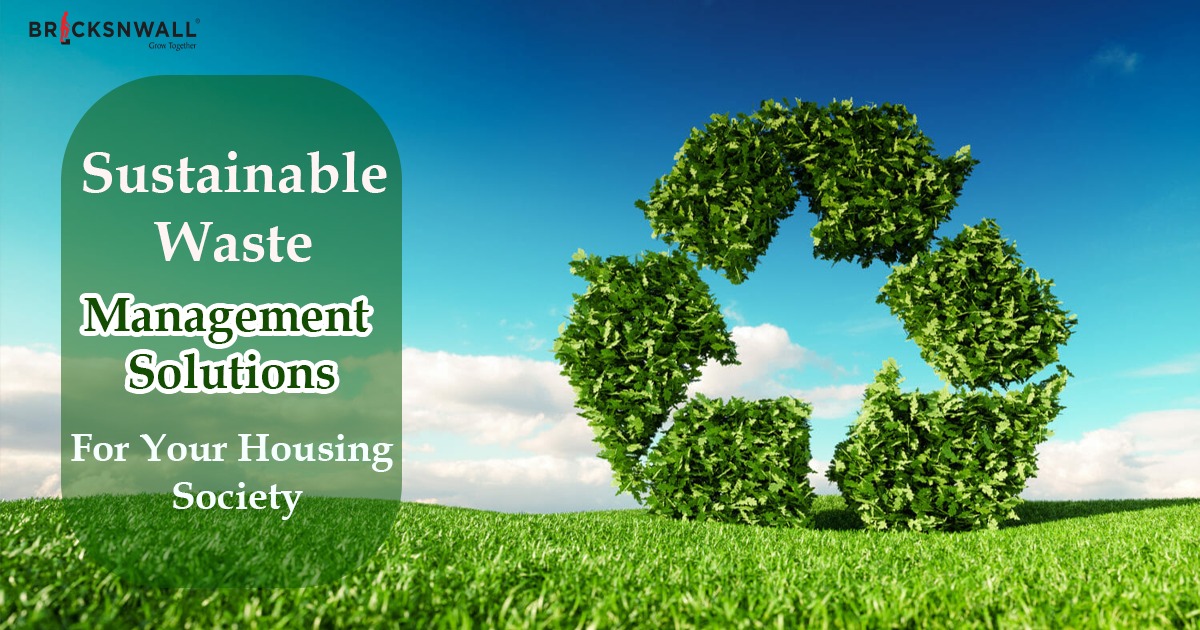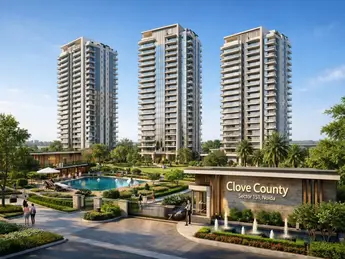Sustainable waste management solutions for your housing society
Bricksnwall Trusted Experts

Understanding Household Waste: A Categorised Breakdown
Every household produces waste, but recognising the various components is critical for responsible management. Here's an overview of the four main categories of household garbage.
1. Organic waste
Organic trash refers to
biodegradable materials derived from living organisms. When organic waste is
put in landfills, it decomposes anaerobically (without oxygen), producing
methane, a strong greenhouse gas that contributes to climate change. Examples
include food scraps (fruit and vegetable peels, leftover food), yard garbage
(leaves and twigs), and paper towels. Composting organic waste at home or
through community initiatives converts it into nutrient-rich fertiliser,
minimising the need for chemical alternatives and boosting soil health.
2. Non-organic Recycling Waste (Solid Rubbish)
This category includes waste
materials that can be treated and converted into new products. Recycling these
products conserves natural resources (trees, metals, minerals), uses less
energy during manufacture than using new materials, and decreases landfill
waste.
Examples include paper products
(newspapers, cardboard boxes), plastic bottles, metal cans (food and beverage
containers), and glass bottles and jars.
3. Hazardous Waste
Improper disposal can affect
both human health and the environment. Improper hazardous waste disposal can
pollute land and water, harm wildlife, and pose health concerns through
inhalation or touch. These items necessitate specific disposal methods, which
may involve collection by authorised agencies or certified hazardous waste
disposal sites. Never put hazardous waste in conventional trash bins.
Batteries, expired medications,
paint containers, discarded cleaning supplies, fluorescent bulbs, and electronics
are all examples of trash.
4. Inert Waste
Non-organic, non-hazardous
materials with negligible chemical or biological reactivity. Inert trash is
normally disposed of separately at authorised landfills or recycling
facilities, depending on the material type and local legislation.
Unlike recyclable or hazardous
garbage, inert waste does not require special processing but does have
specialised disposal requirements due to its size or composition.
Examples include construction
waste (bricks, concrete, tiles), ceramic fragments, and glass shards (from
non-containers).
Residents can divide rubbish into bins labelled as follows:
- Green Bin (Organic garbage):
Food scraps, vegetable peels, coffee grounds, eggshells and yard garbage
(leaves and twigs).
- Paper, plastic bottles, metal
cans, glass bottles, and jars are all accepted in the blue bin (recyclable
waste).
- Red Bin (Hazardous Waste): Used
batteries, expired medications, paint containers, and cleaning products
(see to product labels).
- Black Bin (Inert Waste):
Construction debris (bricks and concrete), ceramic fragments, and glass
shards (excluding bottles and jars).
Colour-coded Bin System: A standardised colour-coded bin system is recommended for proper segregation and collection purposes. This system commonly uses:
- Green dumpsters contain
organic trash.
- Blue containers contain
recyclable garbage.
- Red bins: Hazardous garbage.
- Black bins: inert trash.
- Collaboration With Authorised Waste Management Service Providers: Partnership with registered and authorised service providers is critical for appropriate trash disposal. The service providers are accountable for:
- Collection: the collection of segregated garbage from specific areas throughout society.
- Transportation: Moving
collected garbage to proper processing facilities such as composting
units, recycling plants, or landfills while conforming to specific
standards for each waste type.
- Disposal: Ensuring that garbage is properly and legally disposed of at designated facilities while minimising environmental damage and following to safety rules.
- Find Authorised Service
Providers: Residents or the Resident Welfare Association (RWA) can receive
a list of authorised waste management service providers in their region by
contacting their local municipality or environmental agency. Online tools
and mobile applications can also help you find and connect with licensed
service providers.
Empowering Resident Action: The Three R's of Waste Management
The 3Rs - Reduce, Reuse, and
Recycle - are the foundation of responsible waste management in residential communities.
Residents can make a substantial contribution to a cleaner, more sustainable
environment by adopting and applying these principles at the individual and
communal levels.
Reduce
- Reduce Mindful Consumption: This notion promotes conscious purchase and waste reduction. This involves:
- Plan meals: Creating grocery lists and meal planning based on actual needs helps to reduce impulse purchases and food waste.
- Prioritising bulk purchases: Purchasing bigger quantities of products, particularly ones with minimum packing, can help to minimise overall package waste.
- Supporting Sustainable
Businesses: Choosing companies with eco-friendly packaging and responsible
practices promotes sustainable production and lowers individual waste
footprints.
Practical Tips for Waste Reduction At Home
- Avoid single-use goods. Replace throwaway items such as plastic bags, cups, and cutlery with reusable ones.
- Select sturdy and repairable things. Choose well-made things that can be repaired or maintained over easily disposable alternatives.
- Composting food leftovers and garden trash minimises waste while also producing nutrient-rich fertiliser for gardens or communal gardens.
- Use reusable shopping bags: Bring your own cloth bags to the grocery store and avoid using single-use plastic bags.
- Give thoughtfully: Consider presenting experiences or things with minimal packing to save waste.
Reuse
Promoting a reuse culture can
assist both the environment and the economy, as well as foster community
spirit.
- Community Exchange Programs: Set up events or platforms where residents may trade or give old items such as clothes, books, or furniture, giving them a second life and lowering the demand for new purchases.
- Repair Workshops and Upcycling Events: Organise workshops or events to teach residents about basic repair and upcycling skills. This increases the longevity of products and encourages ingenuity in reworking old materials.
- Benefits of Reuse: Reusing existing products helps homeowners conserve resources and energy used to produce new ones.
- Reduce landfill trash while minimising environmental effect.
- Save money by avoiding unneeded purchases.
Recycle
Effective recycling necessitates effective trash segregation at the source, which is the responsibility of all residents.
- To educate residents, work with their trash management service provider to understand which materials are allowed for recycling.
- This information should be
clearly communicated to residents through informative handouts, posters,
or workshops.
Preparing recyclables:
- Encourage households to clean and sort recyclable materials before placing them in designated bins.
- Provide specific directions on what things are acceptable and what must be removed (such as food residue from plastic containers).
- Addressing Challenges: Limited recycling infrastructure in certain locations can be a challenge.
- Consider other alternatives, such as on-site composting for organic waste.
- Partnering with local recycling programs that may accept a broader range of materials.
- Advocating for better recycling infrastructure with local governments.
By adopting the 3Rs, residents
empower themselves and their community to actively participate in the creation
of a sustainable future. Implementing these behaviours individually and
together decreases waste generation, saves resources, and promotes a cleaner
and healthier environment for everybody.
Conclusion
Practicing appropriate waste management enables your community to contribute to a cleaner, greener India. Residents can create a sustainable future for themselves and their environment by putting the 3Rs into action and encouraging collaboration. NoBrokerHood's software and services may further improve communication, resident participation, and task management, supporting a seamless transition towards a sustainable future for your community.







